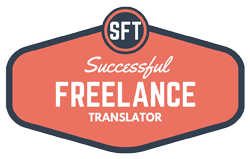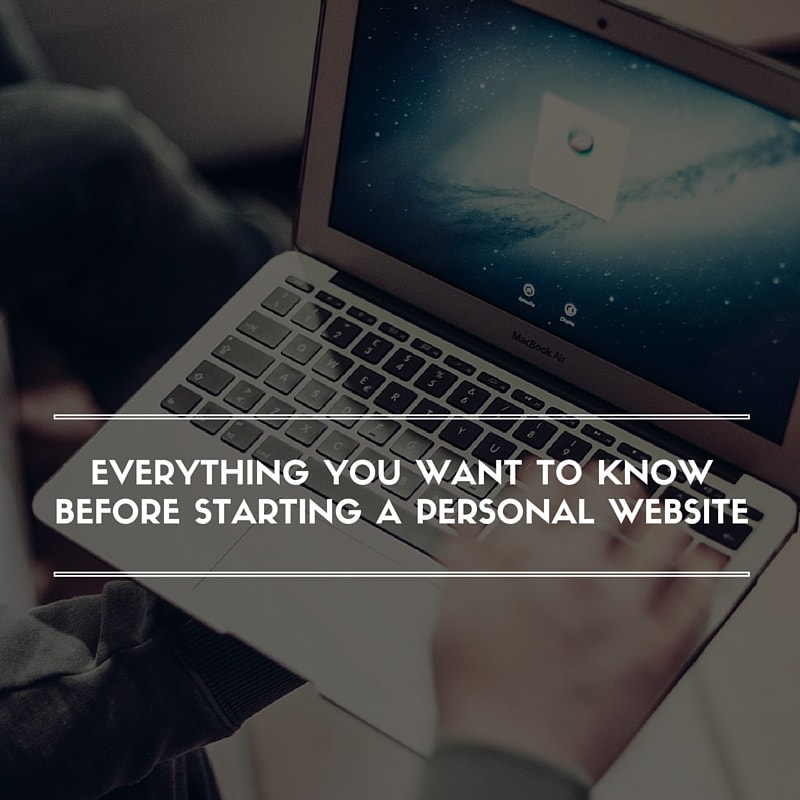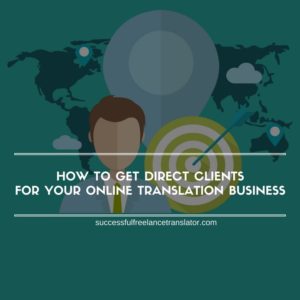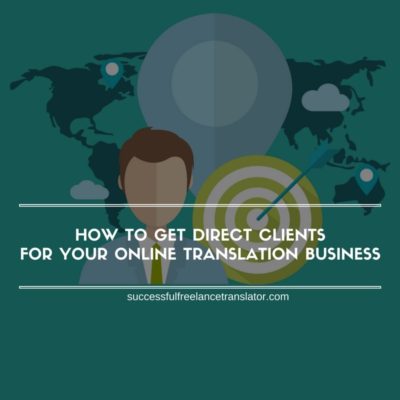Some time ago Dmitry Kornyukhov and Elena Tereshchenkova invited me to take part in a live talk show about translation and translators – BlabbingTranslators. Unfortunately, Elena was away. This time, Dmitry and I were talking about websites for translators. Today I would like to share a video record of this episode. In addition, before the show, Dmitry prepared a list of questions to discuss during this episode. We managed to cover many of them during the show, however, some questions fell out of the one-hour limit. For this reason, I decided to publish a textual form of questions with answers in addition to the video. In this post, you will find the answers to the most common questions about a personal website if you never built a website before and want to start one soon.
– Why is it important to have a personal website?
A personal website is your online headquarters. The Internet offers vast opportunities for promotion of translation services and website is a perfect launching pad.
Of course, you may use third-party platforms, e.g., translation portals. But do you really want to build your business on a rented land? When you create a profile on some platform like Proz, you have limited profile features, you get an outdated design and frankly speaking poor onsite SEO.
On the other hand, when you have a personal website you are the one on top of issues. You may create almost everything you want – add beautiful portfolio, testimonials pages, add interactive content like videos, embed posts from Facebook, Twitter, set up analytics to track your website performance and sales, create forum, use email marketing tools directly on your website, issue invoices and many other awesome things that you cannot get on a third-party platform.
– When did you build your first website? Is it still live?
I created my first website in 2012. I had no idea how to start a website. Everything I knew about site building I learned from a short HTML course in the university. But it was very interesting for me. So, typed How to create a website in Google search and I got lost in the results. Nowadays the problem is in redundancy of information. It is very hard to find what you need. But I was lucky to stumble upon WordPress.com. You know, there are two versions of WordPress site with .com (a free blogging platform) and .org, where you can download a self-hosted version of WordPress CMS. I learned about both and decided to create a self-hosted website. I purchased a WordPress course and started my way in website development. That was a week-long course, but actually, WordPress setup takes about 15-20 minutes if you are doing it for the first time. My first website was about music, movies and books. I invited several friends to post as co-authors. This website existed only due to our enthusiasm. It is still live, but we have not posted anything of a long time.
– What do you need to know if you want to build a personal website for your translation business?
First and the most important is to know your audience. You may have an awesome looking personal website but if you target the wrong audience it is unlikely that you get the results you expect.
You should also think about your website content and structure. You may use paged structure when each of your menu items leads to a certain page or set up a one-page website where all important items will be on the same page – introduction, the list of clients, testimonials, prices, portfolio, contact form, etc. Remember that users are lazy, the fewer actions they have to do before getting what they want, the better conversion you have.
Talking about technical aspects, to run a personal website you need to learn more about the following definitions: hosting, domain name, CMS, theme, and plugin.
- Hosting (or shared web hosting) is a place where your site files are stored. Basically, it is a folder on a web server located somewhere on earth. In other words, hosting is a building, while shared web server is an office you rent in that building.
- Domain name is an address of your website. That is simple. Domain is what you see or type in your browser address bar. It should be unique and it should contain a keyword related to your business. This is very important to find a perfect domain name that is short, clear, SEO-friendly and readable for humans.
- CMS stands for a content management system. WordPress is a CMS that incorporates all functional features necessary to build a website. You have an admin dashboard to manage all aspects of your website: manage users, create pages and posts, change website design and add functionality using plugins.
- A plugin is a script or a piece of code that adds functional features to your website. For instance, social share plugin enables social sharing buttons.
- The theme is a visual shell of your personal website. Basically, the theme is responsible for your website design. What is great, you may change your website visual representation without breaking the entire website structure. You may use free WordPress themes or purchase a premium theme with cool features.
– What tools/platforms do you recommend using when building a personal website?
Except for WordPress CMS, I worked with Joomla and Drupal. You may want to try them too. But I think that WordPress is one of the easiest and at the same time the most powerful CMS for beginners. It has an extensive plugin repository and awesome support forums where you can find an answer for almost any related question. As for the themes and plugins, you may find everything you need in WordPress plugin/theme repository free of charge or purchase premium themes/plugins from ThemeForest or CodeCanyon.
– Is it necessary to have coding skills to build a website?
No, actually to start a personal website using WordPress you don’t need any coding skills. It is great if you learn some HTML or CSS basics. This will help you much to fine-tune your website design. But in general, WordPress installation and setup does not require any programming skills. You just need to follow simple instructions of a hosting provider and you can get your website running in just 5 minutes after purchasing hosting services and a *domain name*Domain will become fully functional and visible for all Internet users 24-48 hours as of your purchase. This time is required for DNS propagation to complete.
– How to choose a right domain name/hosting?
I already mentioned some values a domain name should have. Now let’s consider a list of properties and questions you need to consider when choosing a domain name.
- Creating a website, you develop a personal brand. A domain name can be your brand name. So spend some time to think about what you are going to sell. You are selling translation services. So it will be wise to use the word translation in your domain name This is a highly competitive keyword. And actually, search engine optimization starts with your website domain. Then think about your specialization and languages – they can form another part of your domain name. Also, think of promotion scale. If you want to promote your website locally, probably it is better to use your full name or an invented name as a domain name. If you target a larger international market, you’d better choose industry specific keywords, rather than your full name.
- Try to find a unique domain name. The Internet in the form that we know it exists for over 20 years. That means many sexy domain names are already occupied. Other cool domains can cost thousands of dollars. Believe me, it is not an easy task to find the right and vacant domain name.
- If you found the right name, now you should think about domain zone. Domain zone is what you see after a dot. Actually, you should purchase a second level domain name, e.g. my main site has the following domain – russiantranslator.pro where russiantranslator is a second level domain name, pro – is a domain zone. I would not recommend using third level domains for your business website. For instance, WordPress.com offers free third-level domains like yoursite.wordpress.com. The third-level domain is not professional and, in many cases, it means that you use a free domain. A good domain costs about 12 dollars per year.
- Choose domain zone. I would recommend using .pro zone as it is designed specifically for professionals. You may consider other zones too if you like. Today there are many custom domains like .me, .co, .club, and so on. If you are going to sell translation in a certain locality, you may consider country-level domains like .uk, .ca, .au.
Things to consider when choosing a hosting provider:
Uptime
Uptime is a very important parameter. It means reliability or accessibility of servers of your hosting provider. Not all provider can ensure 100% accessibility. However, 99.6% rating can be considered as acceptable.
Hosting speed
Hosting speed is the second important thing to consider. It consists of three parameters: speed of PHP scripts, the speed of database and site response rate. Overall website loading speed depends on these parameters.
Server location
When selecting a hosting provider you should also consider the location of the provider’s servers. It is recommended to use a provider with servers located in the region of your potential audience. For instance, if you target at the European users – choose a provider with servers located in Europe. Some providers have servers in several regions and you may select servers in your hosting dashboard.
I tested many hosting companies and currently I use the Russian one. A good hosting option starts from 6-7 dollars per month.
Among widely known hosting providers, I would recommend the following:
- Hostgator
- SiteGround
- Bluehost
– What do you think of paid web-site building services like WIX, etc.?
Well, I did not use paid website building services like WIX for my web projects. But I think they anyway they offer a limited set of functions and not so many extensions to improve your website. WordPress, on the other hand, can be anything you like. You may add almost any functionality without much efforts or costs. And you can do that on your own.
Of course, you may try other web platforms, but most of them are good only for a portfolio type sites. I would not expect much from such builders.
– Is it difficult to maintain a personal website?
As I told, WordPress set up take about 5 minutes. If you already know what to do, you will spend a couple of hours to set up all plugins to ensure security, prevent spam, set up marketing, SEO, caching, analytics, etc. You may also spend a couple of days for writing content for your first pages, like homepage, about me, rates, contracts, and so on. The website design takes more time. If you use a premium theme you can create cool custom pages using drag-and-drop editors. Anyway, this also may take several days. In general, it will take from one to two weeks from WP set up to fully functional website. After that, you just need to maintain it, I mean, post new articles at least every week and promote your personal website on a daily basis. So principally I spend at least one hour daily for my website promotion.
– Why is it important to regularly publish new articles?
Posting and updating your website on a regular basis is very important. Google has many ranking parameters. Website freshness is one of them. If you don’t post for several months search engine algorithms will probably knock you out of your position on search results page just because your website content is considered as outdated.
Another reason is users’ interest. If you don’t post regularly the users will forget about you and if they see that there are no updates on your website, they may think that you stopped any activity and will never get back to your website again.
– How can translators use a personal website to attract clients?
The main thing you need to think about when you have a business website is a constant and relevant inflow of traffic. There are many sources of traffic. Principally, according to the recent surveys, the major part of website traffic falls within social networks, Facebook in particular. So you need to consider running an SMM campaign. Create a Facebook page for your website and attract new visitors via this page. Join relevant Facebook groups and post articles from your blog there too. Use Twitter to post updates at least twice a day and also do not forget about LinkedIn.
Social network activity is the fastest method to get new traffic. But in many cases, users from social networks show low conversion rate.
You may also attract visitors via search engines. A lot of people are looking for something specific, for instance, English-Russian translation of contracts. This is what you should speak about on your website if this is your topic – write interesting and useful articles about the English-Russian translation of legal papers and everything related to this topic. Gradually your posts will become searchable and prospects will start finding you on the web and order your services right from your personal website. But do not try too hard with similar content. Actually, this part deserves a separate post.
Use the following tactics to attract new customers through the web search: conduct a keyword search to find out the most searchable words and phrases related to your specialization. You may use Google AdWords tool to find relevant keywords and phrases. Prepare a content plan – a list of topics that include these keywords. Start writing informative and useful articles that help people to solve their problems and you will gradually cover all relevant topics.
Guest blogging is an awesome way to start when you have a new website. Try to search for some blogs that offer guest posting opportunities. As a rule, you may put a link to your website in the bio section of a guest post or put a link to relevant content on your website. Depending on the traffic of a website where you guest post is published, you can get thousands of new visitors via this link in your bio.
– How to measure the return on investment with your website?
In a few words, if you earn more on your website that you spend, it is already a good marker. But I have to note that website is not a fast way to get new clients. If you need something right now, try to contact translation agencies. You will probably pass a text and start receiving your first translation jobs within a week. But if you want to build a successful online business you will have to be patient. Of course, there are many parameters that should be taken into account when you estimate ROI as money is not the only thing you spend. In this case, it is your time. And here everything depends on how you treat your time. In addition, you should also consider the target market. If you are selling only in one city, you will get better results faster than in case if you are selling worldwide.
Let me give you an example. There are two projects I’m working on– the first is for local purposes and the second is for the global market.
It took me two days to run a local website. I set up AdWords campaign and I got my first client in three days of advertising. During the first month of advertising, I spent something around 30 dollars an earned around 200. Is that a good result for a website that is only one month old? I think yes. I returned want I spend and I have earned some extra money.
As for the russiantranslator.pro project, currently I do not expect much from it in terms of new clients. Of course, I already got several clients who found me via this website. But if you visited this site, you might have noticed that the content I post there is targeted at translators only. This was my initial goal. I knew where to promote this content and I knew the audience as I’m a translator myself. The next step is to start posting client-oriented articles that will bring potential clients to my website. Now I have a relatively stable flow of new visitors, but many of them are translators. For the last 6 month, I have managed to reach good results, you may already find my website by several important keywords. Type in Professional Russian Translator and I’m sure you will see my website on the first page. I know that this website will take much more efforts and time. But I’m sure all it worth the time I spent on it.
– What are the examples of do’s and don’ts when building a personal website?
Don’ts
- Never ever use free hosting providers
- Don’t use a third-level domain
- Do not use flash animation
- Do not use background audio
- Avoid low or high contrast in background and text colors
- Avoid complex navigation
- Do not post irrelevant content
- Never ever use automatic promotion methods and so-called black hat SEO techniques
- Do not use hard-sell advertising methods like pop-ups that cannot be closed.
- Don’t be afraid of experimenting
Do’s
- Identify your ideal client
- Prepare and keyword list
- Develop content plan
- Follow your content plan – post regularly (at least once a week)
Useful links
- Hostgator
- SiteGround
- Bluehost
- WordPress Tutorials for beginners
- Nice blog with blogging tips coschedule.com
- Blog about analytics and marketing: blog.kissmetrics.com
- Free WordPress plugins
- Premium themes and plugins: Eelegantthemes.com, Themeforest.net
- Keyword search tools: Keywordtool.io, Adwords
- Google webmasters: tools for webmasters. Track your site’s search performance with Google Search Console and browse around for Google Webmasters support, learning and community resources.
- Google analytics – Get the data you need to make intelligent marketing and business decisions with Google Analytics.



